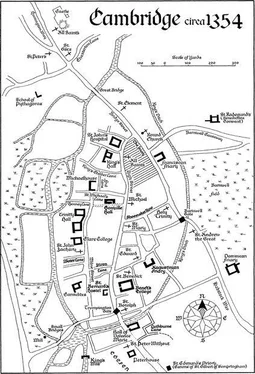When they were shown into his chamber, Prior Lincolne was standing on a stool with a stick in his hand, making lunging swipes at the cobwebs that hung in silken threads from the rafters. Already several large splinters of oaken beam lay scattered across the rugs, where he had been overly rough with his cleaning.
‘Spiders,’ he announced as they walked in. ‘I hate spiders. I do not like the way their webs entangle themselves in my hair.’
Looking at Lincolne’s peculiar topknot, Bartholomew understood why. The tuft of hair barely cleared the lowest of the beams, and would have acted like a magnet to anything hanging from them. The physician imagined that it collected all manner of dirt as it rubbed its way across the ceilings in the various rooms Lincolne would have been obliged to enter during the course of a day.
‘We would like to inspect Faricius’s belongings, if we may,’ said Michael, flinching backward as an especially vigorous poke from Lincolne brought down a shower of plaster. He pursed his lips in disapproval. ‘Do you not have servants for that sort of thing?’
‘We do,’ replied Lincolne, stepping down from the stool, but still towering over his three visitors. ‘However, I have exacting standards, and they seldom reach them. You want to inspect Faricius’s belongings, you say? Why?’
‘We are taking his death very seriously,’ replied Michael. ‘And we want to leave no stone unturned. It is possible that there is something in his possessions that may throw light on the identity of the killer.’
‘Are you saying that your other enquiries have come to nothing?’ asked Lincolne astutely. ‘What about the Dominicans? You would be better concentrating your efforts there, as I have told you before.’
‘And so we will,’ said Michael. ‘But first, I want to see Faricius’s cell.’
Lincolne sighed impatiently. ‘Very well, then. Come with me.’
‘I am sure you have more important things to do than accompany us,’ said Michael. He glanced up at the ceiling. ‘There are spiders to declare war upon.’
‘They can wait,’ said Lincolne, casting a venomous glower at the hapless beings in the rafters. ‘Perhaps the respite will lure them out, and I shall be able to catch them when I return.’
They followed him across the yard to the dormitory. It was afternoon, and a time when the friars were accustomed to a period of rest or private prayer before attending vespers, so a number of them were in the dormitory, some sleeping and some reading. The dormitory comprised a large room that was blocked into tiny cells just large enough to house a mattress, a prie-dieu and a couple of hooks on the wall. Lincolne led the way to a cell near a window that overlooked the street.
‘This was Faricius’s bed. As you can see, he owned very little, but what he had is here.’
The cell was spartan, as a friar’s home was supposed to be, unlike most of the others they had passed, which boasted rugs on the floor and colourful blankets. A bloodstained cloak, that was evidently the one Faricius had been wearing when he died, hung on one hook, while a spare habit adorned the other. A simple wooden cross had been nailed to the wall and a psalter lay open on the bed, as though Faricius had been reading it before he took his fateful last journey.
Michael knelt and peered under the bed, reaching out to withdraw a rough chest that was stored there. Inside were several clean shirts, some woollen undergarments, a spare scrip, and several pens and some parchment. There was also a much-fingered copy of William Heytesbury’s Regulae Solvendi Sophismata . Lincolne gave a gasp of horror and snatched it from Michael’s hands.
‘What is this work of the Devil doing in our friary?’ he demanded. The fury in his voice brought the resting friars, including the gap-toothed Horneby, scurrying to see what was happening.
‘Ah, Horneby,’ said Michael with a predatory smile. ‘Just the man I wanted to see. You do not know where I might find young Simon Lynne, do you?’
Horneby looked furtive. ‘He is probably in the garden, praying.’
Even Lincolne looked doubtful. ‘He will be in the friary somewhere,’ he said to Michael. ‘I have been keeping our students in, because I do not want them attacked by violent Dominicans.’
‘Then I want to speak to Lynne,’ said Michael. He flicked his fingers at a youngster with bad skin. ‘Fetch him, if you please.’
‘Never mind Lynne,’ said Lincolne, turning his attention back to the book, away from the student who scrambled to do Michael’s bidding. He held the tome carefully by one corner, as if it were a dead mouse. ‘I want to know what this filth is doing in my friary.’
‘I imagine Faricius was reading it so he could refute Heytesbury’s arguments,’ said Horneby, although he was unable to disguise the doubt in his voice. ‘It is difficult to prove someone wrong if you are unacquainted with the essence of his argument.’
Lincolne thrust the book into Horneby’s hands. ‘Burn it,’ he ordered uncompromisingly.
‘We have just returned from St Radegund’s Convent,’ said Michael, in the silence that followed. Evidently, none of the student-friars was easy with the notion of burning Faricius’s property. Horneby certainly did not hurry away to do his Prior’s bidding; he stayed where he was, cradling the book in his arms, although at the mention of St Radegund’s, he shot Michael one of the most furtive looks Bartholomew had ever seen, so that the physician suspected the student knew exactly where his friend had been. Lincolne merely seemed surprised by the monk’s statement.
‘What were you doing there?’ he asked in distaste. ‘It is not a place frequented by decent men.’
‘What do you mean?’ asked Michael innocently. ‘It is a community of Benedictine nuns.’
‘It is a community of loose women who wear Benedictine habits,’ corrected Lincolne. ‘Why the Bishop does not expel them and donate the buildings to the University is quite beyond me.’
‘Have you never been there, to observe the nuns at prayer?’ asked Michael casually, although Bartholomew was aware of the intense interest behind his seemingly careless question.
‘That would be an impossibility,’ said Lincolne, taking Michael quite literally. ‘I hear they do not keep their offices – or rather, they keep their offices at times that suit them, rather than when they are supposed to be.’
‘Do you know this from personal observation?’ pressed Michael, still trying to ascertain whether Lincolne was prepared to admit that he had been to one of Walcote’s nocturnal gatherings.
‘I know from rumours,’ replied Lincolne, frustratingly obtuse. ‘I say all my offices here or in the chapel. But you have not told us what took you to such a place, Brother.’
‘Matt was called there to physick the Prioress,’ lied Michael.
‘What was wrong with her?’ asked Lincolne. ‘Was it anything to do with the fact that she had to be carried through the streets of Cambridge in a drunken stupor just after dawn this morning? What did you recommend, Doctor? A dish of raw eggs and pepper, and that she should be more abstemious in the future?’
‘Is that what the Carmelites use?’ asked Bartholomew, answering with a question because he was reluctant to discuss the Prioress’s medical details with Lincolne.
Lincolne nodded, unabashed by the implication that his colleagues should require such a remedy in the first place. ‘And if we have no pepper, we use salt.’
Michael clearly wanted to press the matter of St Radegund’s further, but was aware that if he pushed it too far, Lincolne would grow suspicious, which might prove unproductive in the long term. He sighed and turned his attention to the open psalter, instead. At that moment, the boy with the bad skin returned to say that he could not find Lynne. Horneby’s unease visibly increased, although Lincolne did not seem particularly concerned.
Читать дальше












